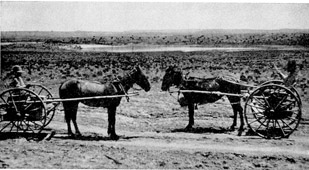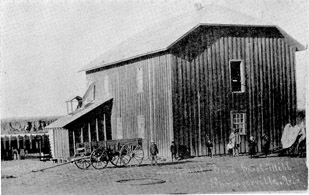| page 172
ARIZONA PIONEER
MORMON
took it.
My birthday found me confined in bed with a three weeks sick spell. Brother
G. H. Crosby, Sr., visited us and gave me a Patriarchal Blessing.
March 8,
1904. Forty-sixth birthday. We are on the homestead with fifty acres of
land fenced, and mostly plowed. Our house enlarged, good cellar built,
comfortable stables, yards, etc., for animals, and two good neighbors (Brothers
Freeman and Farr) close by, with prospects of others soon. Reservoir proved
a
success and one crop of grain and hay raised. A school district has been
granted us and my daughter, Pauline, is teaching the school with an attendance
of eighteen pupils. She taught part of the time in our own house. During
the winter we were visited by dear father, David Udall, and Aunt Rebecca
from Nephi, and sister, Eliza, from Mexico, remaining with us some months.
This birthday found me toothless, having had them all taken out in February
by Dr. Woolford, preparatory to having some new ones.
March 8,
1905. Forty-seventh birthday. I spent the day in traveling from our ranch
home (now a post office called Hunt) to Snowflake in company with brothers
John, Taylor, and Ross, who were going home from the Udall reservoir work
to attend the celebration of my father's seventy-second birthday, March
9, 1906. It was a grand affair, given by the ward to their bishop, who
had served them faithfully for twenty-six years. Held in the stake house,
with refreshments served to everyone present. The ward presented him with
a large armchair for each home, also a beautiful satin banner with motto,
"John Hunt, Bishop of Snowflake. The right man in the right place." There
were original songs, essays, and speeches, and everything went lovely and
made our father feel well.
Daughter
Pauline still taught our district school. The preceding year had been a
very hard one on our nerves. We were obliged to keep our boys out of school
to drive mail, although they were only fourteen and sixteen years of age.
The three older boys (Grover, David, and John H.) drove from Holbrook to
St. Johns (seventy miles) for many months. In
|

